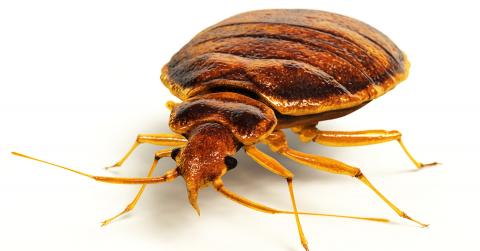Bed bugs are small, wingless insects—about the size of an apple seed—with oval-shaped bodies. They feed on human blood, typically at night when people are asleep. Workers who need to enter homes, like home care workers, paramedics or public health inspectors, are at especially high risk of exposure, along with those who travel frequently for work, and those who work in hospitals, nursing homes, shelters, municipal buildings and schools.

What are the effects of bed bugs?
Some people do not react at all to the bites, while others may have small skin reactions. In rare cases, some people can have severe allergic reactions. Current scientific evidence suggests that bed bugs do not transmit diseases.
There can also be negative social consequences associated with bed bugs. Stigmatization,
physiological distress, sleep disturbances, anxiety, depression and isolation can all occur due to a perception that people whose dwellings have been infested are unclean.
How to check for bed bugs
Check for live bed bugs or their shells in the following areas:
- Behind headboards and around cracks
- and crevices of the bed and baseboards
- In the seams and tufts of mattresses
- Inside the box spring and along the bed frame
- In and around nightstands or other bedside furniture
- Wheelchairs and stretchers
How to deal with bed bug infestations in the workplace
- Staff should be trained to identify signs of bed bugs, where to look for them, how infestations spread, and how employees should respond to a possible infestation.
- Develop a written “bed bug action plan” and ensure all staff members are trained.
- Keep records of infestations to track trends in intensity, location, time of year, etc.
- If an area is suspected of being infested, use personal protective equipment such as coveralls, disposable shoe covers and gloves where appropriate.
- If you think you may have been exposed to bed bugs in the workplace, inspect your clothing and equipment before leaving and change into fresh, unexposed clothing.
- Ensure procedures are in place and equipment is on hand to clean potentially infested clothing and other items.
- If your occupation puts you at a higher risk of exposure, you should incorporate bargaining language related to the prevention and treatment.
What can you do if you find bed bugs in your home?
If you find bed bugs in your home, your local Public Health Unit, landlord, building manager, healthcare provider or a pest control professional can help address the situation.


